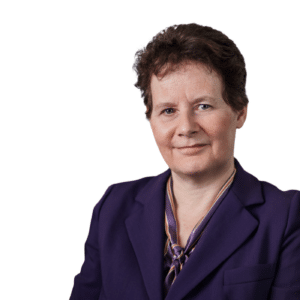The VT Downing Unique Opportunities fund has a focus on small and mid-cap companies. Manager Rosemary Banyard covers the challenges faced by smaller companies, changing sentiment, and political influences on the AIM market during this interview with the Fund Calibre investment team.
They also explore the impact of M&A activities on the fund’s portfolio and turnover and finish with a case study illustrating the concept of long-term compounding success and the fund’s criteria for investing in companies with sustainable moats.
Why you should listen to the interview:
Rosemary’s articulate responses give you an insight into the world of the small and mid-caps fund – complete with company examples, past and present – and the unfortunate prospect of a decreasing investable universe with continued M&A activity.
Please note, answers are edited and condensed for clarity. To gain a fuller understanding and clearer context, tune in to the ‘Investing on the go’ podcast. This interview was recorded on 5 February 2024.
What to look out for in this interview:
AIM companies – the growth engine of the economy
“We’ve got over 50% of this fund in companies of less than a billion market value. And actually, most of that is below half a billion, but it includes about 30% of the fund being listed on AIM and I think there was a difficult period for small companies and for the AIM market in 2023.
“A lot of the year, we still saw private investors selling but also funds in this space responding to redemption requests. And I think that some of that was people deciding that interest rates were a lot higher, and so moving money into cash to earn that more predictable rate. We also saw investors continuing to switch maybe into the US, global funds and maybe tracker funds, et cetera. And all these things resulted in – for a lot of the year – funds selling out of small companies and AIM companies.
“The other thing which remains unresolved still is the future of the AIM market in the sense that there’s potential for political interference here. We’ve had the Conservative party saying they might abolish or reduce inheritance tax, and then we’ve had the potential Labour government saying that they might reduce the tax breaks for investing on AIM. And both of those things in their own way have unsettled people.
“Obviously we don’t know what’s going to happen, but one thing I do know, not least because my boss, Judith Mackenzie, is chair of the QCA, the Quoted Companies Alliance, is that there’s been a lot of lobbying going on to the political parties to explain that AIM companies are very important to the UK economy; they’re big employers; they’re the growth engine of the economy. If you tinker with it too suddenly and too aggressively in terms of the tax situation, you may well force funds that exist purely for these benefits to actually start selling, and we don’t want that. So, I guess that’s still unresolved, but it has affected prices.”
M&A activity in the healthcare sector
“If you look at the wider UK, there’s been something around 40 to 50 takeovers a year since 2014 so there’s been a large exit of often excellent businesses from the market. Some of these takeovers have come from other companies, particularly from the US, and quite a lot have come from private equity. And yes, my fund has benefitted.
“Last year, out of a total of around 30 holdings, we had two that were taken over, both in the healthcare area. One was called EMIS which is the leading supplier of software that runs GP practice systems, and it also runs pharmacy systems, both community and hospital pharmacy systems. It’s an important business and it was taken over by a huge American business called UnitedHealth. They paid a 50% premium to the undisturbed share price to get control of the business
“Because EMIS is a crucial piece of software for the community health system, the bid was referred to the competition authorities and it had a level two reference and so the share price then fell back to the level it was at before the bid. We had initially sold out on the bid approach at the premium and then it fell back, so, I bought back in. The bid was subsequently cleared and so the bidder came back and – unusually, perhaps – we had two bites at the cherry and made two lots of profit in this investment, one in 2022, and then one in 2023. But I am sad to see it go because it’s a unique business, and there isn’t another one on the London market like it.
“The other healthcare company is called Ergomed which provides clinical trials services for pharmaceutical companies who are running trials before they apply to get a drug approved. Ergomed runs trials throughout the world, specialising in cancer trials and what are called orphan drug trials, where the drug has a very limited, very specialist use. And they were taken over by a private equity house, again at a decent premium, but I was, again, sad to see it go
“I do expect more bids in the future. The UK market is still cheaper than the US and so that will probably lead to more US companies bidding for UK counterparts. And I think that private equity still have plenty of cash and they have the tendency to gear up these businesses and that means that they don’t tend to pay much corporation tax because, after they’ve paid the interest, they don’t have much profit initially. So, I still see them coming back to take more companies private as well. It’s very much a double-edged sword. There will be benefits for investors from the premium that they pay, but then we’ve got to find new investments in a shrinking pool.”
The joy of long-term compounding
“The prospectus says that we are investing for the long term and it defines that as over five years which is definitely the horizon on which we invest – and there’s some good reasons for that. If companies are investing, for example they’re recruiting more people, or they’re perhaps taking more office space, maybe they’re building a factory or they’re buying some other businesses; as investors, we get impatient for the rewards from that, but actually in real life it can take a while – it can take two or three years – for these things to bear fruit. So, we want to sit there and give companies time to actually deliver on those investments.
“So indeed, the long-term compounding concept is very much one where a business which already earns very good returns on capital, reinvests some of that capital into the business. And if it can continue to earn high returns, it will compound up in value over time, if you just let the company just get on with it.
“There are numerous examples in the fund, but one that I’d share with you today is a company called Softcat. Softcat is one of three companies listed in London that are, broadly speaking, known as resellers of computer equipment and software. What this means is that they procure hardware – it could be laptops, computers, network equipment – they also procure software, they provide services around cybersecurity, how to set up your IT systems etc. and they do all this, in Softcat’s case, for medium-sized UK businesses. They sell them the hardware and the software and they take a turn. They have good returns and they don’t really need extra capital, their growth is organic, and so they’re just growing through selling more to existing customers – having a greater share of their wallet – and also adding new customers.
“So, what’s the result of that? Well, in Softcat’s case, they floated on the stock market at the end of 2015, and the share price then was £2.40, and the market value was £470m. So, in the time since then, around eight years, they’ve only added 1% to their share capital, which is a few incentive schemes for management, and they haven’t really issued any shares. The share price has gone up six-fold and they’ve had some dividends on top of that. Remember, they floated at £2.40 and the total amount of dividends that you would have received since they floated is £2.13 – so you’ve already has 88% of your initial value back in dividends. So, that’s an absolutely perfect example of a company compounding, and you could hold it for years and you just don’t need to worry about it.”
Conclusion: Despite the number of challenges faced by smaller companies over the last 18 months, Rosemary remains confident that sentiment is changing and opportunities abound in the market as is evident by her excellent examples within the portfolio.
LISTEN TO THE WHOLE INTERVIEW HERE:
Main image: israel-andrade-YI_9SivVt_s-unsplash































